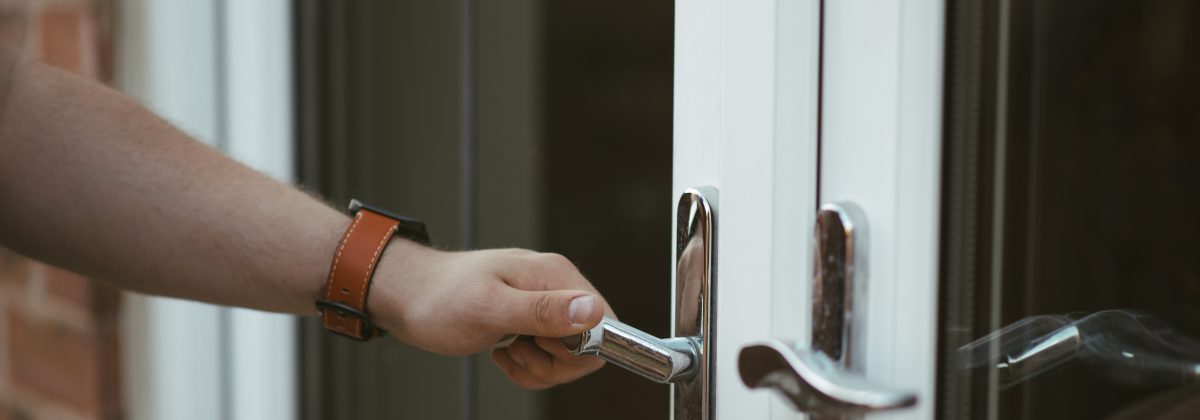

October 9, 2018
As many of us turn our thoughts towards the festive season, or rather what we need to buy and for whom, the following advice from Zurich could prove timely. As the clocks go back with darker nights ahead and we go out en masse for Halloween and Bonfire night, the sad fact is that opportunities for burglaries increase.
Intruders are likely to enter a property using a door, so the right door locks are fundamental in protecting homes. Here are some key considerations you can take into account for each door in your home.
Main entrance or exit doors
A five-lever mortice deadlock conforming to British Standard BS 3621 is a high security door lock that is ideal for home security, as it will have been rigorously tested for burglar resistance against a number of benchmarks.
This type of door lock has a single ‘dead’ bolt that is locked and unlocked with a key. When turning the key, a bolt shoots in to the frame of the door. The lock is embedded in the door for extra strength, providing excellent security. The lock should protect you against a range of burglar attacks including lock picking, force, drilling, manipulation and hacksaw. As you can only open a deadlock with a key, a thief will not be able to gain entry by simply smashing a glass door panel. By fitting deadlocks to properties you are also preventing burglars who enter by a window walking out through a door with your contents.
Clients may also come across BS 8621 locks. These have all the security benefits of the lock above except that they can be operated from inside without the use of a key. This makes them ideal where there are fire escapes or places where a quick keyless exit is required. Care must be taken that windows or letter flaps are not in close proximity to doors that have this type of lock, as someone could simply break a window and open the lock from outside. BS 10621 locks provide the same benefits as above, but also allows the lock to be deadlocked from the outside. This means that if someone breaks in through a window they cannot use the door as an easy means of escape, which would potentially be possible with a BS 8621 lock.
Secondary doors
Doors which are not used as the main entrance or an exit doors, should be fitted with one of the British Standard locks detailed above or a lower level mortice deadlock, supplemented by mortice rack bolts or surface-mounted locking security bolts. Mortice rack bolts are fitted within the door and are operated internally using a threaded key. Surface-mounted locking security bolts are operated with a key to open, but are merely pushed to lock. Both of these types of bolts should be fitted approximately 150mm from the top and bottom of the door. They should also be fitted at 90º to the grain of the wood to reduce the likelihood of the wood splitting if subjected to pressure.
Any glass panels should be laminated and fitted from the inside to prevent the putty or beading being removed. Grilles could also be fitted to the inside of the panels to improve the security further. Many doors are now of composite or uPVC construction, where multi-point locking devices are common and acceptable. Consider upgrading the cylinder to an EN 1303 grade and fit a handle conforming to PAS 24 for added security and protection against cylinder snapping.
French doors
On French doors, both leaves should be fitted with mortice rack bolts or surface-mounted locking security bolts as described above and should be fitted as previously mentioned. If the style of door is capable of it, a mortice sash lock can be fitted for extra security but rebate sets may also be required. As most French doors are outward opening, the addition of hinge bolts is also recommended. They should be located 100 -150mm below the top hinge and similarly above the bottom hinge.
Patio doors
Entry through a patio door is a common means of entry and therefore, unless the doors are fitted with a multi-locking system, it is best to fit extra locks. These are fitted on the bottom fixed frame pushing through to the sliding frame in the centre and on the side frame at the opening point no lower than a third of the way from the top of the door. Most of these locks are push to lock and key to open and are therefore easy to use. It is important to make sure there is enough frame to fit them on if drilling is required. If in doubt, consult the installer or manufacturer.
Some patio doors can be lifted off their track. If you can lift it more than 1/4” simply screw wood blocks of a suitable depth into the channel above the opening door to prevent this. Alternatively, anti-lift devices are available from locksmiths.
Choosing and installing locks
Once you have decided on the type of protection you require, we recommend that you contact a member of the Master Locksmiths Association (MLA) for assistance in choosing and help with installation. MLA members have been Police checked and are regularly inspected for competency and can be found throughout the whole country.
Top tips to prevent property intruders
Call us on 0208 309 5000 for help and advice on your insurance needs.